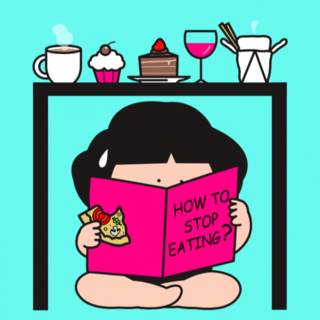Appetite
What Are You Really Hungry For?
The hunger behind the hunger for food.
Posted November 23, 2020

We tend to think about hunger in relation to food, but guess what? We have a lot of hungers for a lot of things. And by hunger, I mean craving, need, thirst, desire, yearning.
Have you ever tried to ignore your hunger for food? Many diet programs tell you to wait a half-hour. Brush your teeth. Chew a piece of gum. Go for a run. And those methods can work, but only for a while. Not to mention they often backfire, because we all know what it’s like to be so hungry that the idea of portion control is untenable. And that’s just relating hunger to food.
Here’s the thing: Understanding our hungers for love, power, freedom, respect and more is critical to understanding our hunger for food.
For example, needing love in an unloving or lacking environment—from a person who is withholding, busy, distracted, or transactional—can really hurt. If this is your situation, you know that when you’ve reached out for love, you’re used to feeling hurt or punished. It doesn’t make you want to reach out again. You may try to have less of a hunger for love. You may call yourself needy, but the hunger persists.
Or maybe you have a hunger to be powerful, to make a difference with your intelligence and advocacy. You speak up about issues that are near and dear to your heart, and people respond by saying, "You’re too much. You’re too demanding. You’re not likable. You’re too loud. You’re a woman, you should sit back. You should listen. Who do you think you are? You’re really not that smart." How shaming!
Your hunger to be powerful is met with the daily onslaught of sexist conditioning women endure from day one. It leads to the suppression of the hunger.
Even when you’re suppressing a hunger, it doesn’t go away. Our deep needs are really strong. They’re huge, and you can’t really stop them.
So your hunger meets resistance and then it backs off a little bit, and then it comes around again. It keeps looking for a way. Your hunger for love, power, tenderness, or something else is going to keep looking to express itself.
One big way emotional hungers get expressed is through food because when these deeper hungers are unmet, we reach for foods that remind us of the satisfaction we truly seek.
A hunger for tenderness looks for itself externally. After a rough day, the psyche will say, “Ooh, I think I’ll have some tea with honey in it. And maybe cream and sugar, too.”
Your inner voice may pipe up, “Well, couldn’t you maybe not put the cream and the sugar in it?”
“But the cream and sugar are so good.”
That anti-cream and sugar voice is in cahoots with ones that say, "You’re too demanding. You shouldn’t be so needy. You should be there for others who need your care." They both argue, however inadvertently, against the expression of your need for tenderness.
A loaded cup of tea is not likely to placate the hunger for power. If that’s not getting expressed, the psyche might crave a fantastic burrito. “I like to eat burritos with black beans, and green chile, and sour cream, and taco meat.” It’s like a big pow of spice and texture and contrast and heat. It has a lot of oomph, and that power in you that’s being suppressed has a lot of oomph too.
The hunger for power looks for oomph and finds it in a burrito. Then you end up looking to satisfy your frustrated need to be powerful, which is always there, with burritos, always there (via various drive-throughs, etc.). And these drive-throughs are offering food that’s been fine-tuned in labs to be addictive. Pretty soon, your desire to be powerful is having unintended effects that contribute to feeling even more thwarted in the world.
People unconsciously pick out foods that allow a hunger to find itself and feel temporarily sated.

The harder it is to meet the hunger in the world, be it love, power, or tenderness, the more yummy, the more addictive it is to have the corresponding foods.
So if you say to yourself, or if your coach or therapist says, “Can’t you give up the food?” it would be like saying, "Can’t you give up being a powerful woman? Can’t you give up wanting tenderness? Can’t you give up wanting love? Come on. Measure your calories, don’t eat the chips after 6, and go for your run, and count your steps, and suppress your need for power, for love, for tenderness."
When someone asks, “Why can’t you just give that up?” it seems so simple. But if you acknowledge the impact of thwarted hungers, you realize it’s as difficult as coming out as yourself—loving, tender, powerful, free-spirited, brilliant—in the world. The question often hurts because people can be hurtful. Think of the trans youth who are killing themselves because it’s so painful to be true to themselves, who risk so much by speaking up.
In my practice, I don’t tell women not to put cream in their coffee, so to speak. I don’t say, “Why can’t you just give that up?” These questions are too often not only ignorant, they're condescending.
In the research for my new book, You Can't Judge a Body by Its Cover, I learned that many women need support to express their power and hungers more. They are looking for support to build boundaries so when they inevitably encounter patriarchal pushback, they see it for what it is: a system of oppression, and it only makes them more dead set on being who they are: their birthright. Suddenly burritos aren’t that alluring. Sure, they’re delicious, but only to the extent that they satisfy a culinary hunger.
So many people never get to this point because they’re caught up in a cycle of dieting, or they give up on the whole endeavor without identifying the hunger of their soul to be their true selves and get their needs met. When you become aware of what you need and who you are, you’re able to remake your life in ways that feed your soul.




